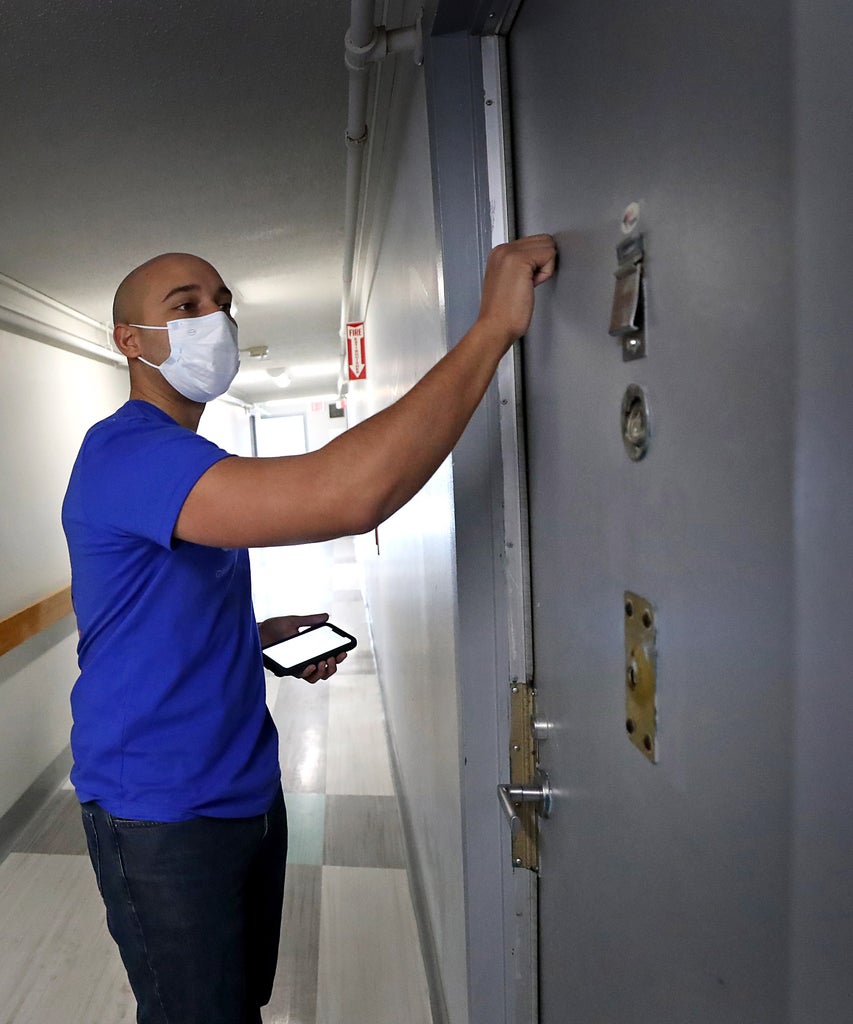
As of May 20, 37.8% of the U.S. population has been fully vaccinated. But even though all Americans over the age of 16 are now eligible for the COVID-19 vaccine, there are still many skeptics: One study showed that nearly one out of every four Americans doesn’t plan on getting jabbed, for a variety of reasons. There are people who worry about side effects, and those who have fallen victim to misinformation around potential health risks that don’t actually exist. There are some people who worry the vaccine was authorized too quickly, and even some men who think protection from a deadly virus is unmasculine. Then, there are people who just have no idea how to go about signing up for a vaccine in the first place.
To combat skepticism, rampant anti-vax conspiracy theories, and general confusion surrounding the shots, people across the country are now going door-to-door to meet with those who are still skeptical about the vaccines. “Our goal is to get as many people vaccinated as soon as possible with equity front and center,” Vicky Kovari, executive director of the Detroit 2020 Census Campaign and head of Detroit’s vaccine outreach campaign, told Michigan Radio. “We’re not ignoring any neighborhoods and we’re really intent on making sure people know this is easy, it’s safe, and it’s important.”
Organizations in a variety of communities run these types of campaigns. A group of volunteers with a group called Together Louisiana started their own initiative in Baton Rouge, LA. Elsewhere, governments are helping fund these outreach efforts. In California, Gov. Gavin Newsom allocated $10 million into funding the door-to-door effort and hiring around 2,000 “callers and door-knockers to help Californians make a plan to get vaccinated.” According to The New York Times, officials in New York City have said the city will give $9 million to community-based organizations promoting vaccine awareness.
All of these groups are employing similar tactics. A New Haven, CT, group, supported by the city’s Health Department, the American Red Cross, and Together New Haven, told the New Haven Independent that volunteers simply provide residents with information about the different vaccines and offer to answer their questions or address their concerns. Canvassers are equipped with fact sheets and common talking points, which include reminders that you don’t need an ID or insurance to get the shot.
Most importantly, though, none of these groups are trying to push or force people to get the vaccine — it’s all about information and trust. Shirley Ann Lawrence, co-chair of the Newhallville Community Management Team in New Haven, added that the goal isn’t to tell people to get vaccinated, but to “make sure that they’re informed and educated about what is actually out there and available to them.” As one Detroit canvasser told Michigan Radio, “I don’t want to argue. That’s not what we’re here for… If [people] don’t want to get it, that’s their viewpoint. I respect it. I will make sure they get that information just in case they change their minds.”
But many people still aren’t receptive, said Tomas Ramos, CEO of Bronx Rising Initiative in New York. Ramos told The New York Times that some residents don’t open their doors, or they just shout, “I’m not getting vaccinated!” from inside their apartments. Some of the efforts do help, though: In Orange County, FL, a group of approximately 150 firefighters and crews visited homes back in March, and successfully got 29 people vaccinated in one day. In California, Newsom said over 4,900 people have scheduled appointments after meeting with door-knockers.
Despite the U.S.’ relatively fast vaccine rollout, there are still major racial and socioeconomic disparities — although canvassers are trying to change that. Take Arizona’s vaccination numbers: Almost 50% of white Arizonans have received at least one shot, compared to 13% of Latinx residents, 3.8% of Asian or Pacific Islander residents, and 2.3% of Black residents.
This month, volunteers in Phoenix, AZ, have specifically been focusing their efforts on reaching residents of the city’s Maryvale neighborhood — an area that was hit hard by the pandemic, and is among the lowest-income neighborhoods in the country. Just 24% of Maryvale residents have been vaccinated, a percentage that organizer Monica Dorsey hopes to increase.
“Everybody is convinced social media is the way to reach people, but if you want to really, really reach them, you have to see them, talk to them, find out what’s on their mind, hear their stories,” Dorsey told Arizona Central. “It’s so important, and it is effective. And we’ll stay at it until percentages get where they need to be.”
Like what you see? How about some more R29 goodness, right here?
What It's Like Getting The Vaccine While Pregnant
No, COVID Vaccine Shedding Is Not A Thing
Vaccinated? Time To Lick Everything
from Refinery29 https://ift.tt/3f5OalS
via IFTTT

